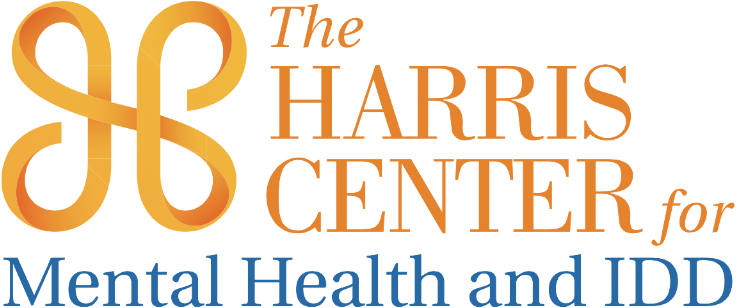
The Harris Center's
Mental Health First Aid
Mental Health First Aid (MHFA)
Mental Health First Aid (MHFA) teaches you how to spot and respond to mental health or substance use challenges in adults. It provides practical skills that can save lives—just like knowing CPR or first aid.
WHY BECOME A MENTAL HEALTH FIRST AIDER?
- Mental health challenges are common – 1 in 5 adults experience them
- Half of all mental health conditions begin by age 14
Who should take MHFA?
Anyone! MHFA equips people with the skills to support friends, family,coworkers, and community members. It answers key questions like “What should I do?” and “Where can someone find help?”
What will I learn in MHFA?
- Signs, symptoms, and risk factors of mental health concerns
- Information on depression, anxiety, trauma, psychosis, suicide, and substance use challenges
- A 5-step action plan to support someone with signs and symptoms of a mental health challenge or crisis
- Available professional supports, resources and self-help strategies
What trainings are available?
MHFA offers specialized trainings tailored for groups such as youth-serving adults, veterans and military families, public safety, and higher education.
- Adult MHFA, offered in English and Spanish, is for anyone who wants to learn how to help someone showing signs of mental illness and/or substance use disorder or experiencing a mental health crisis.
- Youth MHFA is for anyone who works with youth and young adults ages 12-18 who may be in the early stages of a mental health problem, substance use disorder or crisis. Instructors review the risk factors and warning signs for this age group. The training emphasizes the importance of early intervention.
- Veterans, Military Members and Their Families MHFA is customized for family members and anyone who works with veterans, service members and their families. This training focuses on the unique experiences and needs of this population.
- Public Safety MHFA is customized for police, first responders, corrections officers, and other public safety audiences. The training provides officers with more response options to help them deescalate incidents and better understand mental health related calls.
- Higher Education MHFA is customized for anyone in a college or university setting. Instructors train students, faculty and others to recognize the signs of emerging mental illnesses and/or substance use disorder or to assist young adults in a mental health crisis. The training emphasizes the importance of early intervention.
How can MHFA support my business and employees?
Integrating MHFA into your wellness program strengthens workplace culture. It gives leaders and staff practical tools to recognize mental health and substance use concerns, while promoting early support. Supporting mental health is just as vital as supporting physical health.
- 10.8 million full-time workers have a substance use disorder. (Substance Abuse and Mental Health Services Administration)
- As many as 200 million workdays are lost each year due to mental health challenges. (Harvard Business Review)
- Less than 10% of employees feel their workplace is free of stigmas about mental health. (McKinsey Center for Societal Benefit)
What it covers
- Spotting early signs of mental health and substance use challenges
- Having confident, supportive conversations about concerns
- Understanding recovery and ways to encourage it
- Breaking down stigma in the workplace
- Prioritizing safety, trust, and confidentiality
- Strengthening resilience and preventing burnout
- Connecting employees to ERGs, benefits, and HR resources
Who should take it?
- Human resources and benefits partners
- Senior leaders and front-line managers
- Clinical and wellness staff
- All employees dedicated to employee engagement, team building and resilience
- To bring MHFA training to your organization, please contact CommunityTraining@TheHarrisCenter.org.
WHAT IS VETERANS, MILITARY MEMBERS & THEIR FAMILIES MHFA?
Military service deeply affects not only service members but also their families. Many face challenges such as post-traumatic stress disorder (PTSD), depression, and substance use — yet fewer than half ever receive the care they need. Every day, our country loses 20 veterans to suicide. You have the power to help change that.
This free training explores military culture and the unique risk factors impacting service members and their loved ones. You’ll learn a practical 5-step action plan to support someone experiencing mental health concerns, substance use, or a crisis.
For any questions, please contact CommunityTraining@TheHarrisCenter.org.




